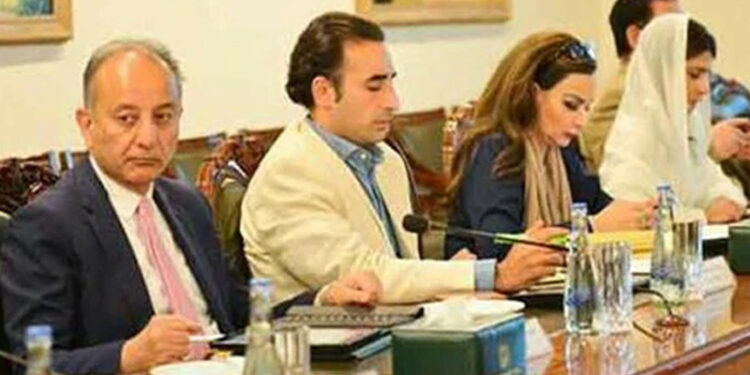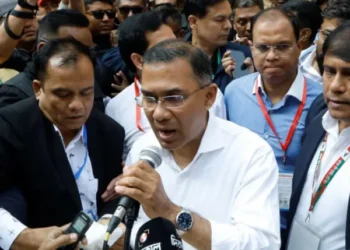Introduction: High-Level Pakistani Delegation Addresses OIC on Regional Security Concerns
New York — In a significant diplomatic move, a high-level Pakistani delegation led by Foreign Minister Bilawal Bhutto Zardari provided a detailed briefing to the member states of the Organization of Islamic Cooperation (OIC) during a session in New York. The briefing focused on recent escalations in tensions caused by India’s aggressive actions along the borders, highlighting the worsening security situation in South Asia.
The Pakistani delegation unequivocally condemned India’s attempts to increase instability in the region through cross-border attacks and unfounded allegations against Pakistan. This comprehensive presentation aimed to inform the international community—particularly the Muslim world—about Pakistan’s perspective on these critical issues, urging collective attention and action.
Background: The OIC’s Role and Pakistan-India Relations
What is the Organization of Islamic Cooperation (OIC)?
The Organization of Islamic Cooperation is an intergovernmental organization consisting of 57 member states, representing the collective voice of the Muslim world. It aims to promote solidarity among member nations and address challenges faced by Muslims globally, including conflicts, economic development, and human rights. The OIC’s involvement in South Asian affairs is significant given the large Muslim populations in the region, especially in Pakistan and Indian-administered Kashmir.
Historical Context of Pakistan-India Tensions
Pakistan and India have experienced decades of conflict, primarily over the disputed region of Kashmir. Multiple wars and numerous skirmishes along the Line of Control (LoC) have created a fragile and often volatile peace. Despite several attempts at diplomacy, recurring incidents of cross-border firing, militant attacks, and political rhetoric have kept tensions high.
India’s recent actions, described by Pakistan as aggressive, include alleged cross-border strikes and attempts to internationalize the Kashmir issue through rhetoric and diplomatic lobbying. Pakistan’s briefing to the OIC comes amid growing concerns that these actions threaten regional peace and stability.
The Briefing: Key Points from Bilawal Bhutto Zardari’s Address
India’s Deliberate Escalation of Tensions
Bilawal Bhutto Zardari accused India of deliberately escalating tensions in the region to justify its cross-border operations. He highlighted that such attacks are often followed by baseless allegations against Pakistan, aiming to mislead the international community and shift blame.
He stated:
“India is intentionally creating an unsafe environment, destabilizing the region, and using unsubstantiated claims to legitimize its aggressive maneuvers.”
Rejection of India’s Link to Pahalgam Attack
One of the focal points of the briefing was India’s attempt to link a recent attack in Pahalgam, a scenic town in Indian-administered Kashmir, to Pakistan. Bilawal Bhutto categorically rejected this linkage, stressing that such accusations made without thorough investigation are highly questionable.
He urged the international community to demand transparent and impartial investigations before accepting such claims, highlighting the importance of facts over propaganda in resolving conflicts.
Water Weaponization: A Violation of International Law
Bilawal Bhutto Zardari also raised serious concerns over India’s approach to water resources, accusing New Delhi of weaponizing water against Pakistan. This refers to India’s control and manipulation of rivers flowing into Pakistan, a matter governed by the Indus Waters Treaty—an agreement brokered with the World Bank that has historically regulated water sharing between the two nations.
The Foreign Minister described India’s actions as a blatant violation of international law and warned that such tactics are punishing millions of innocent people who depend on these water resources for survival and economic development.
Diplomatic Engagement: Meeting with US Acting Permanent Representative to the UN
Alongside the OIC briefing, the Pakistani delegation also held a meeting with the acting permanent representative of the United States to the United Nations. This diplomatic engagement was intended to communicate Pakistan’s position directly to a key global player, seeking support for a peaceful resolution of the conflict and respect for international norms.
The meeting underscored Pakistan’s willingness to engage with all stakeholders in pursuit of lasting peace and regional stability.
OIC’s Response: Solidarity and Call for Respect of UN Charter
The OIC member states appreciated Pakistan’s detailed briefing and expressed strong solidarity with Pakistan’s stance on regional peace and security. The organization reaffirmed the importance of respecting the UN Charter, which advocates for peaceful resolution of disputes and prohibits aggression.
The OIC emphasized that:
- Dialogue and diplomacy are the only viable paths to peace in the region.
- It stands as the moral conscience of the world at this critical juncture, tasked with promoting justice and peace among Muslim nations and beyond.
- The ongoing aggression threatens not only bilateral relations but also regional and global stability, warranting urgent collective attention.
The Path Forward: Dialogue, Diplomacy, and Peace
Pakistan’s Call for Peaceful Resolution
Pakistan has consistently advocated for peaceful dialogue to resolve disputes with India, particularly the Kashmir conflict. Bilawal Bhutto reiterated that military aggression and unilateral actions will only deepen mistrust and conflict.
He urged all parties, including international organizations like the OIC and the United Nations, to play an active role in facilitating negotiations and ensuring that both countries adhere to international law and bilateral agreements.
Regional Impact of Continued Aggression
The continued escalation affects not only Pakistan and India but also neighboring countries and the broader international community. Instability in South Asia can have repercussions including:
- Increased refugee flows
- Economic disruption
- Potential for larger-scale military conflict
- Threats to global peace and security
Hence, the briefing to the OIC also highlighted the urgency for regional cooperation to prevent further deterioration of peace.
Conclusion: OIC’s Crucial Role Amid Rising Regional Tensions
The briefing by Pakistan’s delegation, led by Foreign Minister Bilawal Bhutto Zardari, to the OIC in New York marks an important diplomatic effort to garner support against Indian aggression and to highlight the deteriorating security situation in South Asia.
The clear rejection of unsubstantiated allegations, condemnation of India’s water policies, and call for dialogue reflect Pakistan’s commitment to peace and justice.
The OIC’s response of solidarity and emphasis on the UN Charter underlines the organization’s role as a guardian of international law and peace within the Muslim world and beyond.
As global eyes turn to South Asia, the coming weeks and months will be crucial in determining whether diplomatic efforts can succeed in de-escalating tensions and securing a stable and peaceful future for the region.

























